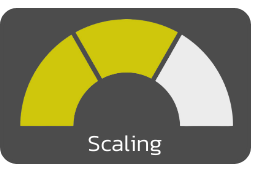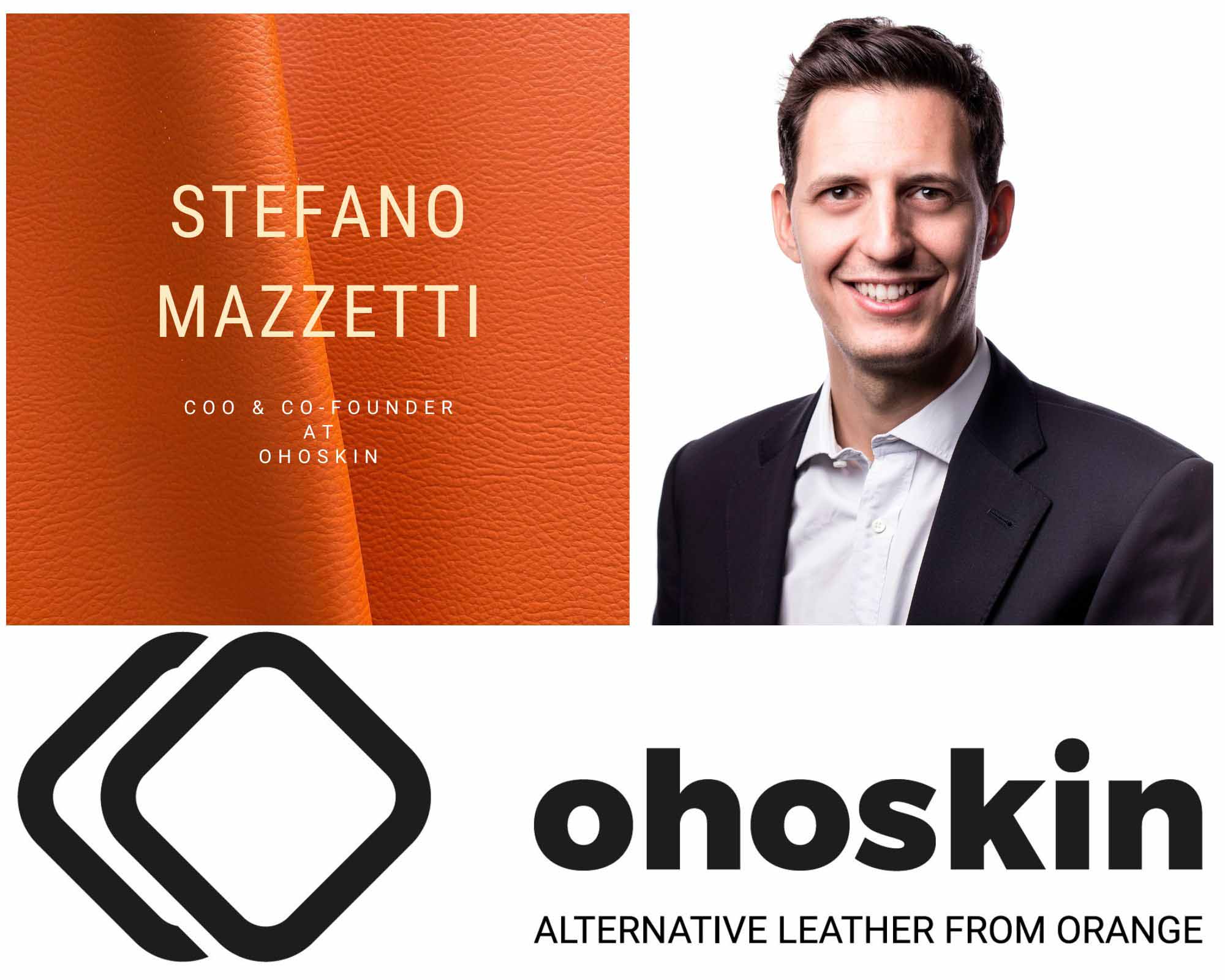
-
Understanding the commercial readiness scale
WTiN’s Commercial Readiness Scale gives an indication of what stage of commercialisation a product is at. It ranges from Emerging: a research stage development; Scaling: the product is being produced on a small but growing scale, and Commercialised: the product is well-established and ready to purchase.


In this episode of WTiN’s Textile Innovation Podcast we speak with Stefano Mazzetti, co-founder and CEO at Ohoskin.
Ohoskin is an Italian company that has created painted fabrics created from orange and cactus byproducts in Sicily. Through a circular economy process, Ohoskin transforms waste into a luxurious, durable material that luxury brands seeking a high-quality, biological, and sustainable alternative to animal leather can use.
Mazzetti delves into and explains Ohoskin’s circular economy principle - giving new life and valorising the agricultural byproducts, turning them into a durable, recyclable premium material. He also touches upon the company’ consultancy project and how it enables other businesses to adopt Ohoskin’s principles.
We also touch upon why Ohoskin has selected orange and cactus byproducts as its main ingredients and speak through the company’s growth – moving from a start-up to a scaling small and Medium-sized Enterprise (SME).
For more information, please visit ohoskin.com.
You can listen to the episode above, or via Spotify and Apple Podcasts. To discuss any of our topics, get in touch by following and connecting with WTiN in LinkedIn, or email aturner@wtin.com directly. To explore sponsorship opportunities, please email sales@wtin.com.
Have your say. Join the conversation and follow us on LinkedIn
-
Transcript
This transcription has been AI generated and therefore may have some inaccuracies.
Ep. 134: Fabrics from orange and cacti waste
In this episode of WTiN’s Textile Innovation Podcast we speak with Stefano Mazzetti, co-founder and CEO at Ohoskin.
WTiN: Hello and welcome to Textile Innovation, hosted by WTiN. My name is Abi and I'm the Features Editor and your podcast host. Each month we will be joined by a special guest. So join me and my colleagues as we deep dive into what's new, what's interesting, and what unmissable innovations have hit the market recently. We cover everything on the podcast, from sustainability to startups and the latest research and development. Plus, we quiz the experts in the field about their products and ideas across the huge spectrum that is the textile industry. So no matter what your interest is, WTiN have you covered and we can connect you to everything you need to know right here from our central hub in the UK.
In today's episode, I'm joined by Stefano Mazzetti, co-founder and CEO at Ohoskin. Ohoskin is an Italian company that has created painted fabrics created from orange and cactus byproducts in Sicily. In today's episode Stefano speaks about the cutting-edge circular economy process that Ohoskin has created and how it transforms these waste byproducts into luxurious and durable materials that are perfect for luxury brands seeking high quality biological and sustainable alternatives to animal leather.
Hi Stefano, thank you so much for joining me on WTiN's Textile Innovation podcast. Please can you tell me about Ohaskin's formation and how it has recently moved from its start-up status to a scaling SME?
Mazzetti: Absolutely, so thank you for giving me the opportunity and to introduce you myself and Ohoskin. Ohoskin was born in 2019 from a simple but powerful idea, transforming the by-products of Sicilian agriculture, that most of them is a citrus and cactus between citrus main important most important is oranges into a premium material alternative to animal leather. We started as a deep tech startup focused on research and development and industrial validation and today Ohoskin is scaling as a structure SME. Our technology is patented. Our supply chain is 100% made in Italy and our materials are already used commercially by international brands in fashion, furniture, automotive.
WTiN: Amazing. And you just touched on that about the products that you use. Why have you chosen to utilise Sicilian agriculture in your products and how sustainable and scalable is this?
Mazzetti: Sicily is where our raw material and our inspiration come from and in particular is the land where my business partner Adrianaana, come from. The island's citrus and cactus production generates a large amount of agriculture by-products that would normally go to waste. By upside, cleaning them, we give value back to the land and to the people who cultivate it. In terms of scalability, our model is highly replicable. The raw materials are abundant, local and renewable. Together with our industrial partner, leading Italian manufacturer, capable of producing over 200,000 of linear meters per year, we have already validated the process on an industrial scale. This allows us to grow without increasing environmental impact.
WTiN: Brilliant and so Ohokin uses biobased polymers and recycled polymers, I believe, from oranges and cacti, like you said. How do you use these two ingredients differently and what properties do they each bring to your end product?
Mazzetti: Sure. Each ingredient brings its own strengths. We integrate these natural raw materials with second generation polymers, either bio-based or recycled, depending on the final application. Our bio-attributed resin combined with orange-derived polymer has led to a family of materials that deliver high durability and technical performances, ideal for premium leathers, good automotive, nautical, interior design application. Meanwhile, the bio-based resin blended with some orange components define a second family of materials, designed specifically for fashion, lighter, more flexible and with a refined textural quality. This flexibility allowed us to balance aesthetic performance and sustainability across our product families.
WTiN: Can you explain how you use cactus as well within that?
Mazzetti: Well yes we patented both of them so the two main by-products of the Sicilian agriculture so citrus in general and cactus. The production to valorize also cactus is quite similar. So we proceed to collect all of these by-products that is very abundant in Sicily. We dry it, we work on it to obtain a really fine powder and then we mix the with the two typology of raising that could be bio-attributed or bio-based. It's absolutely similar to how we process also the citrus peels.
WTiN: Great, thank you so much. And what opportunities do you see for your products and bio-based products more widely in the fashion and textile industry? And I do know that you've had success in the luxury sector. So do you see this translated more widely? I know that's quite a big question.
Mazzetti: Sure. Fashion brands were the first to embrace whole skin. They have long been pioneers in communicating innovation and trustability, sustainability through their products. Today we are seeing a growing demand from the border fashion and textile industry, driven by younger generation and by customers who care about well-being, respect for animals and caution choice, from what they wear to what they eat.
Alongside the regulatory evolution and increased awareness, this shift is pushing brands to look for a scalable, high-performance alternatives that tell a story of responsibility and beauty. Innovative and sustainable materials like Ohoskin are no longer niche, they are becoming essential for the future of responsible design.
WTiN: Can you tell me more about your fossil fuel-free production methods and how you are contributing to a circular economy?
Mazzetti: Sure, we do not define our process as no-fossil but rather the Ohoskin material itself because it's made using renewable feedstocks and produced within a short trustable industrial supply chain entirely based in Italy. We apply circular economy principle by giving new life and valorise the agriculture by-products and turning them into a durable, recyclable premium material. In addition, we share this know-how through a consultancy project that help other companies to valorise their own natural by-products, amplifying the positive environment impact beyond our production.
WTiN: Thank you Stefano. Could you please tell me a bit more about Ohoskin’s consultancy projects and is there anything that you've worked on that you would be able to share with us today?
Mazzetti: Absolutely. Well, consider that we, nowadays, we have a know-how that we developed during the first years of our startup that was able to valorise the by-products, organic by-products. So we decided to give the opportunity to some other company that have a lot of organic byproducts do i define together consultancy project to how to is possible to valorise this of by-products that they have in order to complete their cycle of their products, let me say, and to valorise also what in general they consider like a waste, a scrap.
WTiN: Do you get a lot of brands, manufacturers, companies in the textile industry coming to you to learn from Ohoskin and what you're doing?
Mazzetti: Oh well, about this kind of consultancy project, yes, it's something that is quite new, quite new services and projects that we are offering to other companies, there is a lot of interest, especially for the big companies that use a lot of organics and organics products, let me say, and they have a lot of scrap, because it's something that they can valorise also in their sustainable report something like that that they have to complete and fulfil every year is a is a something that they can they can speak about it in their sustainable report yes.
WTiN: And looking more widely how are you growing the company and what opportunities are there for bio-based leathers in not just the fashion industry but in other industries too?
Mazzetti: Sure, Ohoskin is growing through a strategic partnership in fission, automotive, furniture and interior design. We don't just sell a material, we collaborate with these brands to develop a tailor-made solution, customizing colour, textures and technical features to match their needs. Beyond fashion, the furniture and hospitality sector are becoming a key growth areas, as they are increasing sick materials that combine sustainability, durability and Italian craftsmanship. We are now entering also in the scale-up phasing and expanding our commercial partnership and preparing a new founding round also to accelerate this global growth.
WTiN: Amazing. Thank you, Stefano. And finally, moving forward, what is your vision for Ohoskin? And do you have any partnerships in the pipeline that you are able to tell me about?
Mazzetti: Yes. Our vision is to make Ohoskin the global benchmark for sustainable premium materials, new standards for circular luxury. Beyond our established industrial collaboration, we are strengthening alliance for the co-development of new products. Nowadays we are collaborating with fashion brands such as Ganni and international automotive groups, including our partnership with Microlino and with Next to expand our presence globally. Ultimately, our goal is simply yet ambitious to prove that sustainability and beauty are not opposites, they can and must coexist.
WTiN: Amazing, thank you so much, that was really insightful.
Mazzetti: My pleasure, really.
WTiN: Thank you so much for listening. If you have any questions or want to learn more, you can follow us on LinkedIn at World Textile Information Network or you can contact me directly at content@wtin.com. If you are interested in sponsoring an episode of the podcast please email sales@wtin.com. Thank you and we'll see you next time.




